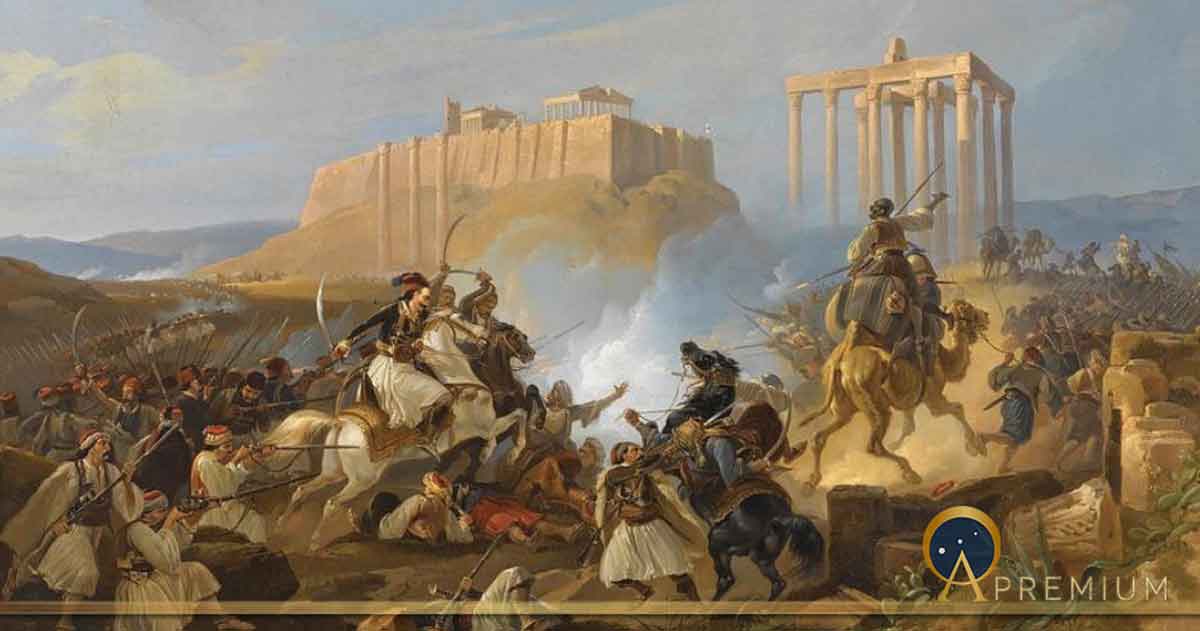The Ancient Origins Of Modern Greece
Nationhood is a figment of the collective imagination, actualized by a cluster of symbols and ideas – flags, anthems, sports teams, traditional dress (sometimes), a common religion (often), shared values (whether or not they are upheld) – which help to build a sense of collective identity. Of course, a nation state is a geographical entity as well, though it is perfectly possible to be a nation without actually owning any territory. The ancient Hebrews in their years of wandering considered themselves to be what today would be called a nation, long before they acquired a homeland. But in essence the nation state is a relatively recent idea, which came to fruition in the 19th century.

The Byzantine castle of Angelokastro successfully repulsed the Ottomans during the first great siege of Corfu in 1537, the siege of 1571, and the second great siege of Corfu in 1716, causing them to abandon their plans to conquer Corfu (Dr.K. / CC BY-SA 3.0)
This is certainly true of the Greek nation state, which arrived on the world stage as the result of the War of Independence that the inhabitants of the Greek mainland and the Aegean Islands waged against the Ottoman Turks. The Ottoman Turks had been in power in the region since 1457 and Greece as an independent country only came into being in 1830, when, as a result of what was called the London Protocol, the Great Powers, notably Britain, France, and Russia, having fought alongside the Greeks, magnanimously (in their eyes, no doubt) bestowed nationhood on the fledgling entity that emerged victorious from the war. It was an entity that was very much the creation of those Great Powers – a romanticized Greece indissolubly bound to its Classical past.
First Hellênes of Hellas?
So, when did the ancestors of the people who call themselves Hellênes, citizens of the country called Hellas, first appear? The question can only be answered very approximately. The earliest evidence for humans living in Greece goes back to the Lower Palaeolithic era, when elephants, rhinoceroses, mammoths and lions roamed freely through the land mass known as Eurasia. In 2015, a team of archaeologists excavating at Marathousa near Megalopoli in the Peloponnese, currently the earliest known archaeological site in Greece, unearthed a location where elephant butchery took place some 50,000 years ago. The identity of those engaged in this activity is, however, impossible to determine. It is unknown whether they even belonged to homo sapiens, or whether they were Neanderthals.
Like this Preview and want to read on? You can! JOIN US THERE ( with easy, instant access ) and see what you’re missing!! All Premium articles are available in full, with immediate access.
For the price of a cup of coffee, you get this and all the other great benefits at Ancient Origins Premium. And - each time you support AO Premium, you support independent thought and writing.
Dr Robert Garland obtained his M.A. in Classics from McMaster University and his Ph.D. in Ancient History from University College London. His research focuses on the social, religious, political, and cultural history of both Greece and Rome. He has written 17 books including The Greek World: A Study of History and Culture (The Great Courses)
Top Image: The Siege of the Acropolis, by Georg Perlberg (CC BY-SA 4.0)

















Comments
The promotion of Pagan Greek origins may be seen even in the reintroduced Olympic Games. De Coubertin was a high degree Freemason tasked with destroying the true Sabbath (Saturday) with sport, and the false Sabbath (Sunday) with it later besides, as well as ensuring generations would be indoctrinated in the Pagan Greek subject at school.
This diminished the understanding of the role of early AD Greek-speakers in the rise of Christianity. Indeed, the name 'Barbara' is a likely testament to the faith of these Greeks. It is from the same root as 'barbarian', which is an odd thing for devout early Greek Christians to call some of their daughters, esoecially given how zenophobic Ancient Greeks could be. Or maybe it wasn't that odd. It could well have been one in the eye to the Greek Pagans to effectively name one's daughter as a 'foreigner' when she wasn't one, given the Pagans regarded her Christian religion as foreign, thus throwing the insult back in their Pagan faces.
Modern Greece was a reconstruction by the powers that be, not were, for these powers are still with us. As such, these powerful elites can play the long game and, in the case of modern Greece, that was the promotion of Ancient Greece as a powerhouse of Pagan culture and more.
These powers that be are anti-Christian and pro-Satan and, therefore, it fits them well to promote Ancient Paganism while pretending to be pro-Christianity. This was achieved by creating an Orthodox Christian country at the expense of fairly brutal Ottoman Islam, a Christian country in thrall to its glorious Pagan and equally brutal past even to the extent of pretending that Ancient Greece was greater in sciences, philosophy, democracy and other affairs than it probably was.
Pretending is the elite default setting, after all. Most modern history, and often accepted history in general, is or was pretence. Still, as a minion one can make a good career out of pretence if one takes it seriously enough to constantly pretend it is not actually pretence, but truth. Or one can simply believe it anyway.
People tend to believe that which they want to believe and the history of Greece, both Modern and Ancient, is no exception.